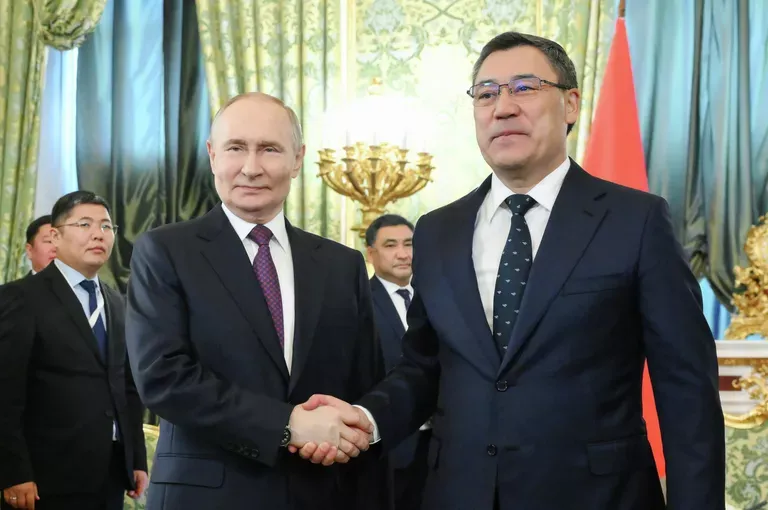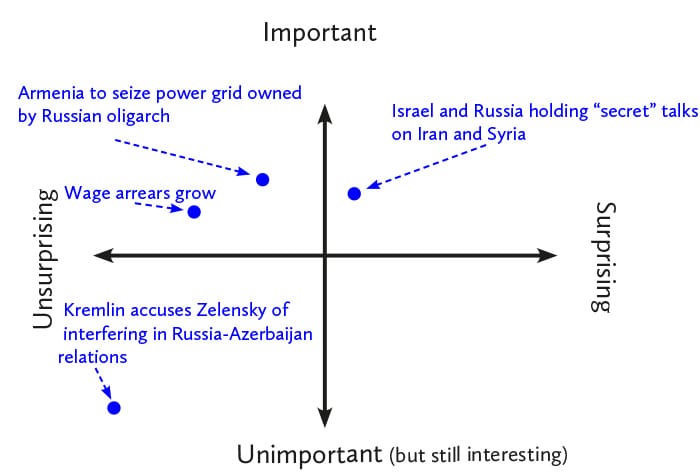0700GMT//Armenia to nationalise power grid owned by Russian oligarch; Russia and Israel discuss Iran

RELATIONS WITH AZERBAIJAN: The Kremlin said on Wednesday that Volodymyr Zelensky was trying to "destabilise relations" between Azerbaijan and Russia after he posted a message on X/Twitter saying he'd telephoned Azerbaijani Pres. Ilham Aliyev to chat through "Russia's brutalisation tactics". Kremlin spokesman Dmitry Peskov also blamed local police action in Yekaterinburg for sparking Azerbaijan-Russia tension. (COMMENT: This is the first high-level Kremlin comment on fracturing Russia-Azerbaijan relations since two Azerbaijanis were killed in a police raid in Yekaterinburg on Friday.)
Reports from Russians in Azerbaijan said that document checks and random police stops have increased. Some social media channels in Central Asia are cheering on Azerbaijan in its row with Russia. They are framing it as Azerbaijan giving back as "good as it has been taking". (COMMENT: These former Soviet states are used to seeing their citizens paraded in Russian courts bruised and dazed after being roughed up by Russian police. Although the Kremlin's inter-governmental relations in Central Asia are generally good, Central Asian citizens are increasingly wary of travelling to Russia for work. Russian police regularly round up, beat up and humiliate migrant workers. Many get forced into the Russian army to fight in Ukraine.)
Azerbaijani officials have denied that they are closing Russian-language schools. This was reported by several Russian Telegram channels on Wednesday.
RELATIONS WITH ARMENIA: Armenia's parliament on Wednesday passed the first reading of a bill to nationalise the country's power grid, currently owned by a pro-Kremlin Russian-Armeinan billionaire. Samvel Karapetyan was arrested in Yerevan last month for allegedly plotting a coup. (COMMENT: The Kremlin has spoken out in Karapetyan's defence. His case could seriously further strain Armenia-Russia relations. Armenian PM Nikol Pashinyan wants to take Armenia into the EU, something that the Kremlin wants to stop.)
RELATIONS WITH KYRGYZSTAN: Putin hosted Kyrgyz Pres. Sadyr Japarov in the Kremlin on Wednesday, talking up trade and the importance of Russian language schools. (COMMENT: Although Putin and Japarov meet fairly regularly on the sidelines of various summits, this was a rare trip by Japarov to Moscow specifically to meet with Putin in the Kremlin. The data is not entirely clear but this may be the first time that this has happened since the Kremlin invaded Ukraine in 2022. The meeting and photo-op appear to be Putin's way of thanking Japarov for the help that Kyrgyzstan has given Russia in skirting around Western sanctions.)
TALKS WITH ISRAEL: Israel and Russia have been holding secret talks on how to de-escalate tension in Iran and Syria, both Russian and Israeli media have reported. They said that the talks have been going on for about a week. This has not been officially confirmed. (COMMENT: Although relations have frayed between Israeli PM Benjamin Netanyahu and Russian Pres. Vladimir Putin since the Kremlin invaded Ukraine in 2022, Israel still regards Russia as having a unique position in the Middle East and some useful influence. The Kremlin managed to rebuild its relations with the revolutionary government in Syria despite backing the overthrown regime of Bashar al-Assad, and it has a "strategic alliance" with Iran.)
ASSYMETRIC WARFARE: A court in Estonia on Wednesday blamed Russian intelligence services for ordering an attack on a Ukrainian restaurant and supermarket last year. The court said that Russia's GRU hired two Moldovan men to firebomb a rural supermarket and then a restaurant in Tallinn called "Slava Ukraina" ("Glory to Ukraine"). (COMMENT: Security services in the Baltics have said that these sorts of low-level attacks are increasing and are part of the GRU's "asymmetric war" against Europe.)
ECONOMIC WARNING: German Gref, the CEO of the Russian state-owned Sberbank, said on Wednesday that he "saw many signs of an economic slowdown" in Russia. He also said that interest rates needed to be slashed by several percentage points. (COMMENT: Gref is a former economy minister and has been the CEO of Sberbank since 2007. Russian businesses have been warning that interest rates of 20% are choking the Russian economy.)
WAGE ARREARS: Wage arrears in Russia increased by 300% between December and March, a Trade Union report seen by the pro-Kremlin Izvestia newspaper reported on Wednesday. It quoted the document as saying that the problem was "acute". (COMMENT: This is more evidence of serious economic problems building up in Russia. These warnings are not from disgruntled opposition figures but from pro-Kremlin institutions.)
SERVICE SECTOR CONTRACTION: Russia's services sector contracted for the first time in 12 months, the S&P Global Purchasing Managers' Index showed. It fell below 50 (which marks a contraction) to 49.2 in June from 52.2 in May.
STANDING UP TO THE KREMLIN: Valentin Konovalov, the Communist party governor of the Khakassia republic in Siberia, on Wednesday vetoed a law to scrap the region's two-tier system of local governance. He accused Vladimir Putin's ruling United Russia party of trying to centralise power. United Russia dominates Khakassia's regional assembly and passed the law to adopt the legislation. Konovalov, as the governor, is allowed to veto it. (COMMENT: Konovalov is one of the only regional governors in Russia not aligned with United Russia. Last month, Putin signed into law a bill that allows regional governments to scrap municipal authorities. Although it has been dressed up as a money-saving project, this is a power grab by United Russia and the Kremlin. United Russia controls most regional governments but local authorities are more rebellious and more difficult to control. In Bashkaria, another region in Siberia, the decision to scrap regional authorities triggered mass protests.)
NEWS MATRIX:

News that Israel and Russian diplomats have been holding secret talks on Iran and Syria hasn't yet been confirmed but if it is, it will confirm that Russia is still an influence in the Middle East. It will also help the Kremlin to rehabilitate its relations with Israel and the US. The Armenian parliament's move to seize its power grid system from a pro-Kremlin Armenian-Russian oligarch is important as it could seriously strain bilateral relations.
